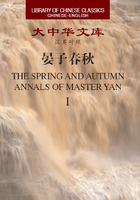
1.16 [16] 景公贪长有国之乐晏子谏
齐景公贪图长久保有国家的乐趣,晏子进谏
【原文】
景公(将)观于淄上,与晏子闲立。公喟然叹曰:“呜呼!使国可长保而(傅)〔传〕于子孙,岂不乐哉?”晏子对曰:“婴闻明王不徒立,百姓不虚至。今君以政乱国,以行弃民久矣,而(声)欲保之,不亦难乎?婴闻之,能长保国者,能终善者也。诸侯并立,能终善者为长;列士并学,能终善者为师。昔先君桓公,其方任贤而赞德之时,亡国恃以存,危国仰以安,是以民乐其政,而世高其德。行远征暴,劳者不疾,驱海内使朝天子,而诸侯不怨。当是时,盛君之行不能进焉。及其卒而衰,怠于德而并于乐,身溺于妇侍而谋因〔于〕竖刁,是以民苦其政,而世非其行,故身死于胡宫而不举,虫出而不收。当是时也,桀、纣之卒不能恶焉。《诗》曰:‘靡不有初,鲜克有终。’不能终善者,不遂其君。今君临民若寇雠,见善若避热,乱政而危贤,必逆于众,肆欲于民,而(诛虐)〔虐诛〕于下,恐及于身。婴之年老,不能待(于)君使矣,行不能革,则持节以没世耳。”
【今译】
1.16 [16] DUK E JING COVETED THE JOY OF POSSESSING THE STATE FOR A LONG TIME. YANZI REMONSTRATED.
Duke Jing was looking at the view from the bank of the Zi River[1] while he was standing idly w ith Yanzi. The Duke heaved a sigh and said: “Oh,if my state could be protected for a long time and then be passed on to my descendants,would that not be a joy?”
Yanzi answered: “I have heard that the enlightened kings did not ascend the throne w ithout a reason,and the people did not come to them in vain. But now for a long time you,my Lord,have played havoc w ith the state through your government and by your conduct you have abandoned the people; yet you say[2] you w ish to protect the state—is this not difficult? I have heard that he who can protect his state over an extended period is the one who can do good his entire life. Moreover,the regional prince who is able to persist in doing good his entire life becomes the superior among his peers. When officers study together,he who does good his entire life becomes their master. In the past,when our former ruler Duke Huan first employed the worthy and praised the virtuous,even a doomed state m ight have maintained its existence by relying on him,and an endangered state might have been made safe by looking up to him. For that reason,the people rejoiced at his way of governing,and the entire world highly esteemed his virtue. He traveled to distant places in his campaigns against the violent,and those who labored for him did not complain. He had sway over the entire country between the seas and induced the regional princes to pay court to the Son of Heaven,[3] and they did not complain. During that period,our mighty ruler’s virtuous conduct could not have been surpassed. In his final days,however,when the state declined,he neglected virtue and was overcome by pleasure. He became besotted w ith women,and he plotted matters with Shu Diao.[4] For this reason,the people suffered from his government and the entire world condemned his conduct. Therefore,when he died in the Hu Palace,the burial ceremonies were not performed; even when worms crept out of his corpse,he was still not put into a coffin.[5] During that period,even Jie and Zhou could not have come to a worse end. As it says in the Odes:
A ll are good at first;
But only few succeed to the last.[6]
He who is not able to do good through the end of his days is one who cannot successfully fulfill his role as ruler. But now you,my Lord,rule the people as if they were an enemy; at the sight of someone good,you seem as if you want to escape the heat; you play havoc w ith the government and you endanger the worthy; you are bound to act contrary to the multitude; you make unrestrained demands on the people and cruelly punish your subjects. I am afraid you w ill personally suffer the consequences. I am already old and cannot be expected to continue in my service to you,my Lord,much longer. Unless you are able to radically change your conduct,I w ill maintain my moral integrity until I die—that and nothing more.”
注释
[1]River Zi 淄 appears on the historical maps of the Chunqiu period. It is located in present Shandong province near M ount Tai 泰山.
[2]Retain 声 (SBCK,I,19a3).
[3]Tianzi 天子—“Son of Heaven,” from the Zhou dynasty on,a standard designation to the supreme sovereign of China. The Son of Heaven was traditionally regarded the mediator between Heaven and the human world and the capital from which he ruled was an axis mundi,a pivot about which the four quarters revolved. For a detailed discussion of the title of “The Son of Heaven,” see “Son of Heaven: Shamanic Kingship,” and “Son of Heaven: Kingship as Cosmic Paradigm” in Julia Jing,ibid,1-66.
[4]Shu Diao 竖刁 w as a member of an infamous group of officials who served Duke Huan in his final days. He emasculated himself in order to take charge of the Duke’s harem. See Guanzi,11.2/86/1.
[5]See Guanzi,10.1/76/1.
[6]Shijing,255/131/14.